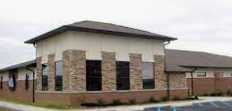Dearborn County CBOC

Contact Details
-
Name:Dearborn County CBOC
-
Address:1600 Flossie Drive
Lawrenceburg, IN - 47025 -
Phone:812-532-2538
-
Email:
-
Instagram:
-
Website:
Description
There are currently state and federally funded or sponsored drug and alcohol treatment centers in the state of Indiana
Questions & Answers
Help others like you find out more about Dearborn County CBOC. Do you know the answers to any of these questions? Contribute now and help others like you.
What kinds of care do they offer?
-
Mental health treatment
Includes interventions such as therapy or psychotropic medication that treat a person's mental health problem or condition, reduce symptoms, and improve behavioral functioning and outcomes.
-
Substance use treatment
Refers to a broad range of activities or services, including identification of the problem (and engaging the individual in treatment); brief interventions; assessment of substance abuse and related problems including histories of various types of abuse; diagnosis of the problem(s); and treatment planning, including counseling, medical services, psychiatric services, psychological services, social services and follow-up for persons with alcohol or other drug problems (Institute of Medicine, 1990).
-
Treatment for co-occurring substance use plus either serious mental health illness in adults/serious emotional disturbance in children
Housing for individuals recovering from substance abuse that is designed to provide a drug and alcohol-free living environment and appropriate support services to facilitate movement to independent living. Such housing includes transitional living, sober houses, sober living, recovery houses, and 3/4 houses.
What types of treatment approaches do they offer?
-
Individual psychotherapy
Focuses on a patient's current life and relationships within the family, social, and work environments through one-on-one conversations with a therapist. The goal is to identify and resolve problems with insight, as well as build on strengths.
-
Couples/family therapy
Are two similar approaches that use discussions and problem-solving sessions facilitated by a therapist to help couples and family members improve their understanding of and the way they respond to one another. This type of therapy can resolve patterns of behavior that might lead to more severe mental illness. Family therapy can help educate about the nature of mental disorders and teach skills to better cope with the effects of having a family member with a mental illness, such as how to deal with feelings of anger or guilt.
-
Group therapy
Involves groups of usually 4 to 12 people who have similar problems and who meet regularly with a therapist. The therapist uses the emotional interactions of the group's members to (1) help them get relief from distress and (2) possibly modify their behavior.
-
Cognitive behavioral therapy
Involves recognizing unhelpful patterns of thinking and reacting, and then modifying or replacing these with more realistic or helpful ones. The therapy can be conducted with individuals, families, or groups, and clients are generally expected to be active participants in their own therapy.
-
Dialectical behavior therapy
A cognitive behavioral treatment approach with two key characteristics: a behavioral, problem-solving focus blended with acceptance-based strategies, and an emphasis on dialectical processes. "Dialectical" refers to the issues involved in treating patients with multiple disorders and to the type of thought processes and behavioral styles used in the treatment strategies. DBT has five components: (1) capability enhancement (skills training); (2) motivational enhancement (individual behavioral treatment plans); (3) generalization (access to therapist outside clinical setting, homework, and inclusion of family in treatment); (4) structuring of the environment (programmatic emphasis on reinforcement of adaptive behaviors); and (5) capability and motivational enhancement of therapists (therapist team consultation group). DBT emphasizes balancing behavioral change, problem-solving, and emotional regulation with validation, mindfulness, and acceptance.
-
Telemedicine/telehealth therapy
The ability for healthcare providers, working from a distance using telecommunications technology, to communicate with patients, diagnose conditions, provide treatment, and discuss healthcare issues with other providers to ensure quality healthcare services are provided. Other names used for this treatment approach are: e-medicine, e-therapy, e-psychiatry, and telepsychiatry.
-
Abnormal involuntary movement scale
The Abnormal Involuntary Movement Scale (AIMS) is a rating scale that was designed in the 1970s to measure involuntary movements known as tardive dyskinesia (TD).
-
Smoking not permitted
Smoking is not allowed.
What type of setting is this location?
-
Outpatient
Describes patients who receive treatment services without an overnight stay at a treatment facility or hospital.
Who is responsible for the operation of this facility?
-
U.S. Department of Veterans Affairs
Facility operated by the U.S. Department of Veterans Affairs, including general hospitals, and/or residential treatment programs, and/or?psychiatric out?patient clinics.
-
Federal Government
What types of payment or funding do they accept?
-
Cash or self-payment
Payment for treatment is made by the person directly, through cash or other means, rather than using health insurance.
-
Private health insurance
-
Federal military insurance (e.g., TRICARE)
-
U.S. Department of VA funds
Is any payment assistance available?
-
Payment assistance (check with facility for details)
A program which helps low-income, uninsured, or underinsured patients who need help paying for all or part of their medical bills.
What specific groups are treated here?
-
Veterans
Facility has a program or group specifically tailored for Veterans.
What ancillary services are offered at this facility?
-
Chronic disease/illness management
A systematic approach to improving health care for people with chronic disease. Central to most CDM approaches are patient self-management, physician education, and organizational support. Among the variety of strategies employed are case management, continuous quality improvement, disease management (DM) and the chronic care model (CCM).
-
Court-ordered outpatient treatment
Known by different terms in different states, such as, ?assisted outpatient treatment (AOT),? ?involuntary outpatient treatment,? or ?mandatory outpatient treatment.? Forty-four states permit the use of court-ordered outpatient treatment as a condition for persons with severe mental illness, who are too ill to seek care voluntarily, to remain in their community. Each state has its own civil commitment laws that establish criteria for determining when court-ordered treatment is appropriate for these individuals. (https://www.crimesolutions.gov/ProgramDetails.aspx?ID=228)
-
Family psychoeducation
Helps consumers and their families and supporters, through relationship building, education, collaboration, and problem solving to: 1) learn about mental illness; 2) master new ways of managing their mental illness; 3) reduce tension and stress within the family; 4) provide social support and encouragement to each other; 5) focus on the future; and 6) find ways for families and supporters to help consumers in their recovery.
-
Illness management and recovery
Uses a standardized individual or group format based on five evidence-based practices: 1) Psychoeducation, 2) Behavioral tailoring, 3) Relapse prevention training, 4) Coping skills training, and 5) Social skills training.
-
Suicide prevention services
Include identifying risk factors; educating staff on identifying the signs of suicidal behavior and using methods to detect risk; and the assessment, intervention, and management of suicidal patients including treatment of an underlying mental or substance use disorder, and use of psychotropic medication, supportive services, and education. Hotlines help individuals to contact the nearest suicide prevention mental health provider.
What specific pharmacotherapy treatments do they provide?
-
Nicotine replacement
Administers nicotine to the body by means other than tobacco, without other harmful chemicals found in tobacco. Common forms of nicotine replacement therapy are nicotine patches, nicotine gum or lozenges, nasal spray and inhaler. The goal of nicotine replacement is to prevent cravings in a tobacco user, allowing the person to abstain from tobacco.
-
Non-nicotine smoking/tobacco cessation
Are medications that do not contain nicotine but act on the brain to reduce a person's craving for tobacco. Some common medications are Bupropion (Zyban, Wellbutrin), and Nortriptyline (Pamelor). Medications are often prescribed in conjunction with behavioral counseling or support groups to provide the best chance for achieving long-term smoking abstinence. (http://www.mayoclinic.com)
-
Chlorpromazine
Chlorpromazine is used to treat the symptoms of schizophrenia and to treat the symptoms of mania in people who have bipolar disorder. It helps you to think more clearly, feel less nervous, and take part in everyday life. It can reduce aggressive behavior and the desire to hurt yourself/others. It works by helping to restore the balance of certain natural substances in the brain.
-
Droperidol
Droperidol injection is used to prevent the nausea and vomiting that may occur after surgery or diagnostic procedures. It has also been used as an antipsychotic.
-
Fluphenazine
Fluphenazine is a decades-old antipsychotic medication used to treat schizophrenia and psychotic symptoms such as hallucinations, delusions, and hostility.
-
Haloperidol
Haloperidol is used to treat psychotic disorders and is also used to control motor tics and verbal tics in adults and children who have Tourette's disorder. Haloperidol is also used to treat severe behavioral problems such as explosive, aggressive behavior or hyperactivity in children who cannot be treated with psychotherapy or with other medications. Haloperidol is in a group of medications called conventional antipsychotics. It works by decreasing abnormal excitement in the brain.
-
Loxapine
-
Perphenazine
-
Pimozide
-
Prochlorperazine
-
Thiothixene
-
Thioridazine
-
Trifluoperazine
-
Aripiprazole
-
Brexpiprazole
-
Cariprazine
-
Clozapine
-
Lurasidone
-
Olanzapine
-
Paliperidone
-
Quetiapine
-
Risperidone
-
Ziprasidone
-
Antipsychotics used in treatment of SMI
A multi-disciplinary clinical team approach, helps those with serious mental illness live in the community by providing 24-hour intensive community services in the individual's natural setting.
What types of screening and assessment methods are used here?
-
Screening for tobacco use
Determines a client's use of tobacco products, such as cigarettes, cigars, pipe tobacco, or smokeless tobacco. It is generally recommended that providers screen for tobacco use on a regular basis by asking clients, as they are seen, about their current and past use of tobacco products and their exposure to secondhand smoke or tobacco.
What kinds of education and counseling services are offered here?
-
Smoking/vaping/tobacco cessation counseling
Includes interventions for persons who use tobacco and want help with stopping, including behavioral support or counseling in groups or individually.
What age groups are accepted here?
-
Young Adults
Facility accepts young adults (13-25) for treatment.
-
Adults
Facility accepts adults (26-64) for treatment.
-
Seniors
Facility accepts seniors (65 or older) for treatment.
What types of testing do they offer?
-
HIV testing
Determines whether you are infected with HIV, a virus that weakens the immune system and can lead to acquired immunodeficiency syndrome.
-
STD testing
Testing to determine the type of sexually transmitted disease a person may be carrying.
-
TB screening
Skin tests that are used to screen people who are at high risk for TB exposure such as people with diseases or conditions that weaken their immune system.
-
Metabolic syndrome monitoring
-
Laboratory testing
What type of facility is this?
-
Veterans Affairs Medical Center or other VA healthcare facility
Is vaping allowed at this facility?
-
Vaping not permitted
How do I apply for admission at this location?
Have you been to this facility? What was your experience?
Is there a wait-list for treatment center?
Is any payment required?
Related Posts
Cincinnati VA Medical Center
- Cincinnati, OH
- 17.87 miles away
Bellevue CBOC
- Bellevue, KY
- 19.19 miles away


